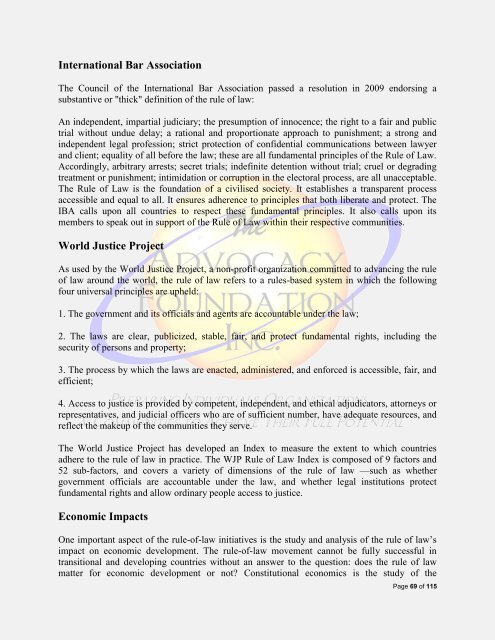Judicial ReEngineering
Judicial ReEngineering
Judicial ReEngineering
You also want an ePaper? Increase the reach of your titles
YUMPU automatically turns print PDFs into web optimized ePapers that Google loves.
International Bar Association<br />
The Council of the International Bar Association passed a resolution in 2009 endorsing a<br />
substantive or "thick" definition of the rule of law:<br />
An independent, impartial judiciary; the presumption of innocence; the right to a fair and public<br />
trial without undue delay; a rational and proportionate approach to punishment; a strong and<br />
independent legal profession; strict protection of confidential communications between lawyer<br />
and client; equality of all before the law; these are all fundamental principles of the Rule of Law.<br />
Accordingly, arbitrary arrests; secret trials; indefinite detention without trial; cruel or degrading<br />
treatment or punishment; intimidation or corruption in the electoral process, are all unacceptable.<br />
The Rule of Law is the foundation of a civilised society. It establishes a transparent process<br />
accessible and equal to all. It ensures adherence to principles that both liberate and protect. The<br />
IBA calls upon all countries to respect these fundamental principles. It also calls upon its<br />
members to speak out in support of the Rule of Law within their respective communities.<br />
World Justice Project<br />
As used by the World Justice Project, a non-profit organization committed to advancing the rule<br />
of law around the world, the rule of law refers to a rules-based system in which the following<br />
four universal principles are upheld:<br />
1. The government and its officials and agents are accountable under the law;<br />
2. The laws are clear, publicized, stable, fair, and protect fundamental rights, including the<br />
security of persons and property;<br />
3. The process by which the laws are enacted, administered, and enforced is accessible, fair, and<br />
efficient;<br />
4. Access to justice is provided by competent, independent, and ethical adjudicators, attorneys or<br />
representatives, and judicial officers who are of sufficient number, have adequate resources, and<br />
reflect the makeup of the communities they serve.<br />
The World Justice Project has developed an Index to measure the extent to which countries<br />
adhere to the rule of law in practice. The WJP Rule of Law Index is composed of 9 factors and<br />
52 sub-factors, and covers a variety of dimensions of the rule of law —such as whether<br />
government officials are accountable under the law, and whether legal institutions protect<br />
fundamental rights and allow ordinary people access to justice.<br />
Economic Impacts<br />
One important aspect of the rule-of-law initiatives is the study and analysis of the rule of law’s<br />
impact on economic development. The rule-of-law movement cannot be fully successful in<br />
transitional and developing countries without an answer to the question: does the rule of law<br />
matter for economic development or not? Constitutional economics is the study of the<br />
Page 69 of 115

















